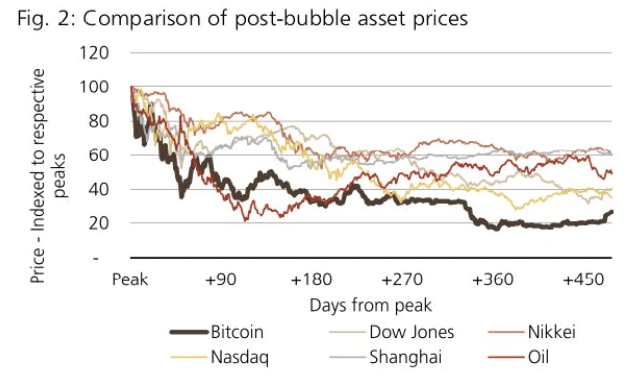Bitcoin’s Path to Retake $20,000 Could Be Slow and Painful: Analyst

Bitcoin's recovery could be slow and painful before recapturing its peak. | Source: Shutterstock
By CCN.com: John McAfee continues to trumpet a bitcoin price that will hit $1 million by the end of the decade. He isn’t even afraid of betting his manhood on the same. Nonetheless, crypto bears keep coming back to spoil the party. One such doubter is UBS analyst Kevin Dennean.
UBS Analyst: Bitcoin Price Faces a Long Road to Recovery
According to Forbes, Dennean recently wrote :
“We’re struck by how long it took other asset bubbles to recover their peak levels (as long as 22 years for the Dow Jones Industrials) and how pedestrian the annualized returns from trough to the recovery often are.”
Dennean went on to add that “crypto-bull contingents should consider what happens after the bubble–not every bubble that bursts recovers the old highs.”
The analyst believes that just like other asset classes, the BTC price faces a slow and painful path to recovery. He likened the bitcoin price “bubble” to the 1929 Dow Jones collapse, suggesting he thinks it might take slightly more than two decades for the cryptocurrency to reach its highs of $20,000.
That’s a bold prediction to make considering the BTC price has rallied this year and now sits at approximately $5,300.

A Flawed Strategy that McAfee Would Disapprove
John McAfee recently reminded his followers that bitcoin is not a stock.
That’s why it is futile to value the cryptocurrency in the same way as stocks.
Bitcoin is not a stock. At its heart, bitcoin is a digital currency independent of any centralization. It’s designed to make peer-to-peer payments. So the mechanics of bitcoin prices are completely different than that of a stock, which is why Dennean’s throwback to the Dow Jones crash isn’t an apples-to-apples comparison.
Bitcoin’s Rally Is Here to Stay
Bitcoin prices could keep soaring because both technicals and fundamentals are intact.
Bitcoin’s two-week moving average convergence divergence (MACD) indicates a positive trend for the cryptocurrency for the first time since May 2015. As it turns out, the bitcoin price has not tested its lows for 123 days and could be gearing up for a sustained rally.
On the fundamental side, rising demand could fuel more gains. Of course, McAfee’s prediction for $1 million BTC by 2020 seems like a huge stretch, but perhaps in the long run.
Wences Casares, a director at PayPal, is of the opinion that bitcoin’s success as a decentralized currency will be the key to its growth. The lack of developed financial systems in certain economies could lead to an increase in the number of people holding bitcoin.
Bitcoin is a big hit in African nations as it is turning out to be the preferred means of sending and receiving payments abroad in place of the U.S. dollar.
Critics sometimes miss the point that bitcoin is not a stock but rather a digital currency whose aim is to enable peer-to-peer payments independent of any central authority. That’s why analysts should never value it using the mechanics of stock valuation or else they might have to eat their words and will look foolish in the long run.